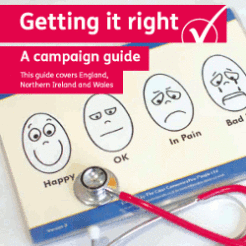Mencap has been named the overall winner at this year’s Charity Awards for a campaign which highlighted the NHS’s poor treatment of patients with learning disabilities and helped to change working practices.
Accepting the award from minister for the Cabinet Office Francis Maude and CAF chief executive John Low, Mencap’s national officer for profound and multiple learning disabilities Beverley Dawkins OBE paid tribute to those who had died as a result of poor treatment by the NHS.
She said: “This award is very much for them as they were the inspiration behind the campaign, and we thank them very much.”
Earlier, receiving the award for the disability category, David Congdon, head of campaigns and policy, said: “I’d like to say thank you on behalf of the six families who played a magnificent part in helping to get justice.”
58 times more likely to die
Prompted by the fact that people with a learning disability are 58 times more like to die before their 50th birthday, the charity began campaigning on this issue in 2007.
It made a major breakthrough that year with Death by Indifference, a report which described the deaths of six people with a learning disability who had died because of inadequate treatment.
The report caused an immediate stir and convinced the Department of Health to launch an independent inquiry, which the following year referred to “appalling examples of discrimination, abuse and neglect” and supported Mencap’s recommendations.
Mencap continued to lobby hospitals where deaths had occurred, initiate legal test cases and support families through the complex NHS complaints process, before launching a new phase of the project, Getting it Right, in 2010.
This involved supporting hospitals and healthcare professionals by providing best practice guidance on how to deliver quality healthcare to this unique group.
The Getting it Right Charter was signed by over 200 NHS trusts and hospitals, and includes ensuring all staff understand mental capacity laws, appointing a learning disability liaison nurse in all hospitals, providing learning disability awareness training and listening to and involving families and carers.
There is now evidence that these reforms are being put into place, while annual healthchecks have been given to 50,000 people with a learning disability in the year since they were first introduced.









